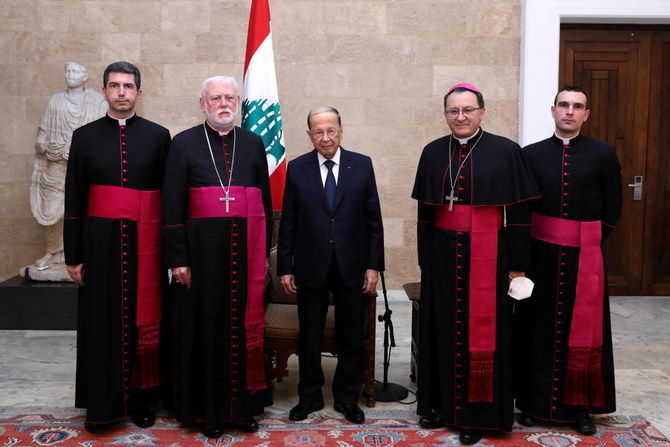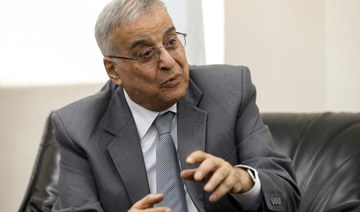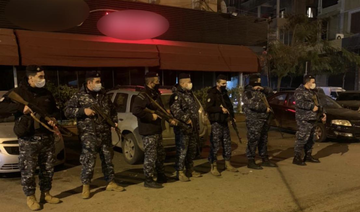BEIRUT: A Vatican envoy criticized Lebanon’s politicians on a visit to Beirut on Tuesday, saying “those in power must make the decision to work for peace and not for their own interests, and must stop using Lebanon and the Middle East for foreign interests”.
Archbishop Paul Gallagher, Vatican secretary for relations with states, passed on Pope Francis’ message to Lebanese President Michel Aoun that “any weakening of (the) Christian presence would destroy the internal balance and Lebanese identity.”
He stressed the pope’s concern over the situation in Lebanon to Aoun and Speaker Nabih Berri, saying: “He believes that reforms, along with the support of the international community, will help Lebanon preserve its own identity.”
On the first day of his visit, the archbishop met commander-in-chief of the army, Joseph Aoun, and academics at Saint Joseph University. He also prayed for the victims of the Beirut port explosion.
Gallagher will meet Maronite Patriarch Bechara Boutros Al-Rahi on Wednesday and inaugurate a conference titled “Pope John Paul II and Lebanon the Message,” before meeting Prime Minister Najib Mikati and other heads of Muslim communities on Thursday.
The archbishop told Aoun that the pope is closely following developments in Lebanon, the presidency’s press office said. Quoting the pontiff, Gallagher said: “Lebanon deserves exceptional attention, as the entire Middle East looks to it as a message for the future, and from here comes the necessity of preserving the Lebanese national identity, and if the situation does not develop positively, it will be reflected in the region.”
The archbishop emphasized that “a strong and united Lebanon can set an example for the entire Middle East, with its Christians and Muslims, in the service of the common good for all, and we hope that it plays this role again in the future.
“It is easy to say that Lebanon is a message; however, we must work together to make this message a tangible reality.”
Aoun called on the Vatican to continue its support “in view of the gravity of the challenges facing us, which are unprecedented in the modern history of Lebanon, and we hope that, through this support, along with the support of other friends of Lebanon in the world, we will overcome the negative repercussions of the regional crises and conflicts.”
The archbishop conveyed to the Lebanese people “the pope’s concern for the country due to the deep economic, social and political crisis.”
He said the Vatican’s position was that “reforms, along with the support of the international community, are necessary to help Lebanon preserve its own identity, as an example of peaceful coexistence and brotherhood between different religions.”
Gallagher urged “the international community to continue providing support and assistance to Lebanon.
“Let there be an end to the few profiting off the suffering of many. No more letting half-truths continue to frustrate people’s aspirations; the Lebanese must have an opportunity for their children to have a better future in the country, away from any external interference,” he added.
The archbishop expressed the Vatican’s fear over Lebanon’s uncertain future. “We call on everyone, all leaders — locally and internationally — to preserve Lebanon as a message of living together, brotherhood and hope among religions,” he added.
Asked if the Vatican could be a mediator, he said: “Diplomatic activity is a dialogue between representatives of internationally recognized entities. In any dialogue, it is not possible to predict the outcome, however, we will encourage political leaders and civil society. When we talk about the role of mediator between political players, we can fulfil this role if there is an invitation to the Holy See.”
He added that Pope Francis would like to visit Lebanon soon.
In a statement after meeting Aoun, the archbishop expressed the need “to bring justice to the victims of the horrible Beirut port explosion, and all the Lebanese people.”
Forty days have passed since the judge leading the probe into the explosion, Tarek Bitar, was dismissed from the case on Dec. 23.
A delegation of the victims’ families met on Tuesday with Nader Kasbar, president of the Bar Association, to inquire about the reasons for the bar not taking any position on obstacles in the investigation of the blast, which happened on Aug. 4, 2020.
Hezbollah has succeeded in dividing families of the victims putting pressure on authorities to find the truth.
Gebran Bassil, head of the Free Patriotic Movement, criticized — along with Hezbollah — Bitar’s work, after having previously defended him, with the investigation now at a halt.




























